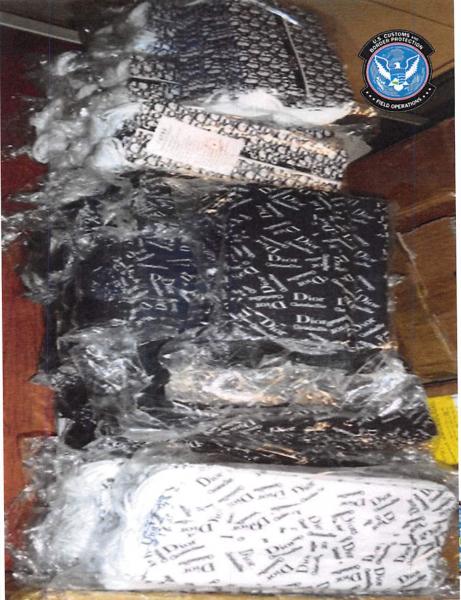Indianapolis, Indiana - U.S. Customs and Border Protection (CBP) officers in Indianapolis halted a shipment arriving from China that contained more than 4,500 designer face masks.

On May18, CBP officers in Indianapolis detained a shipment heading to Arecibo, Puerto Rico. CBP officers inspected the parcel to determine the permissibility of its contents in accordance with CBP regulations.
Inside officers found 4,550 counterfeit medical face masks from fashion designers such as Dior (1,150), Louis Vuitton (1,100), Gucci (1,400), Burberry (400), and Fendi (500). The face masks were reviewed by an import specialist who determined the items were counterfeit. If these items were real, the total MSRP for these would have been more than $1.36 million.
“On a daily basis, criminals try to send fake designer products in hopes of disrupting our economy,” said Kerry Carter, Acting Port Director-Indianapolis. “These masks were inspected and found to be counterfeit. Our officers are highly trained by industry experts and will continue to seize these items to protect consumers and other industries.”
In Fiscal Year 2020, the volume of counterfeit PPE and medical supplies increased significantly. CBP seized more than 12.7 million counterfeit face masks, nearly 180,000 FDA-prohibited COVID-19 test kits, more than 38,000 FDA-prohibited chloroquine tablets, and thousands of other illicit and potentially unsafe medical and sanitary products.
Criminal groups are exploiting the exponential growth in e-commerce to introduce counterfeit and unsafe goods into the American market. Most of the counterfeit goods interdicted by CBP originated in China. On average, CBP processed more than 420,000 parcels of mail and 180,000 express consignment shipments from China each day of Fiscal Year 2020. In partnership with U.S. Immigration and Customs Enforcement, CBP seized 26,503 shipments in Fiscal Year 2020 that contained counterfeit goods. Had they been genuine, the manufacturer’s suggested retail value of the seized goods would have been $1.3 billion.
Every year, CBP seizes millions of counterfeit goods from countries around the world as part of its mission to protect U.S. businesses and consumers. These goods include fake versions of popular products, such as smartphones and related accessories, electronics, apparel, shoes, cosmetics, and high-end luxury goods, as well as goods posing significant health and safety concerns, such as counterfeit pharmaceuticals, bicycle and motorcycle helmets, medical devices, supplements and other consumables. Sold online and in stores, counterfeit goods hurt the U.S. economy, cost Americans their jobs, threaten consumer health and safety, and fund criminal activity. Visit the National IPR Coordination Center for more information about IPR including counterfeiting and piracy.
CBP has established an educational initiative to raise consumer awareness about the consequences and dangers that are often associated with the purchase of counterfeit and pirated goods. Information about the Truth Behind Counterfeits public awareness campaign can be found at https://www.cbp.gov/FakeGoodsRealDangers.